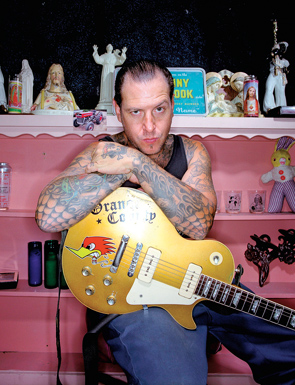Dear Guitar Hero: Mike Ness
All the latest guitar news, interviews, lessons, reviews, deals and more, direct to your inbox!
You are now subscribed
Your newsletter sign-up was successful

He’s led one of the pioneering acts of SoCal’s early Eighties punk movement for 33 years and counting. But what Guitar Worldreaders really want to know is…
I’m really excited to hear what you and the guys have been working on these past months. Can you tell us a little bit about the new record? Any new gear or tricks up your sleeves? —Scotty
The name of the record is Hard Times and Nursery Rhymes, but it should be called “Tone,” because it’s got the best tones that we’ve ever had on an album. We cut it at Ocean Studios in Burbank with some of the best outboard gear you could ask for. Pultec, Fairchild…you name it, they got it. The engineer, Duane Baron, was very helpful in trying to get the sounds that I wanted. He hipped me to a couple different miking techniques for the amps, but mainly it was just getting everything to tape: guitars, drums and vocals. I can’t even listen to music on an iPod, let alone make an album in a living room. I never will. We didn’t dump it into digital until the last minute. As far as guitars, I had my whole arsenal there, and Jonny [Wickersham] had his. We have quite a collection between the two of us. I’ve always gone with my Seventies goldtop and my sunburst Les Pauls, just because they seem to cut through a little bit more and lay the bed for everything else. Jonny’s a little more flexible; he plays Fifties Teles and Les Paul Juniors, and it works for him.
In the early days, you were using an SG. What made you switch over to Les Pauls with P90s? Also, what string gauge are you currently playing with? —Ricky Breez
I switched over to Les Pauls in the late Eighties when I realized they weren’t as heavy as I thought. And I really liked the sustain that they have. Eventually, I toured with Neil Young and realized that I liked the Deluxes because of the slightly tapered neck. I picked the brain of Neil Young’s guitar tech that tour. I watched his tech pull the thin mini-humbucker out of a Les Paul Deluxe, drop it in the trash can, and put a P90 in it. I’ve been using P90s ever since. As far as strings go, we use Ernie Ball. I believe it’s the 10–52 set. It’s got heavier strings at the bottom, where you need it, but you still have the flexibility in the upper strings.
The production on [2004’s] Sex, Love and Rock ’n’ Roll is noticeably bigger than on previous Social Distortion albums, especially the guitar sound. What setup did you use to get that massive tone? —Cohen Heart
I’m pretty sure it was my Fender Bassman. That’s the motor that drives this machine. But I can tell you that, as good as those songs might have been, we’ve left them in the dust with this new record. The problem with that record was that things got a little overcompressed. We were still in the mindset of stacking guitars and all that. I’ve learned now that less is better. We’ve got the tones already, so it’s just about getting the instruments to tape the right way. I mean, you listen to an old Bad Company record and you hear four instruments playing. That’s it. But it’s recorded fat, through analog equipment and a nice board, and captured with proper miking techniques. So we’re going back to the basics.
All the latest guitar news, interviews, lessons, reviews, deals and more, direct to your inbox!
Your music has gotten me through some of the roughest parts of my life, specifically when I was getting over my drinking problems. Did you ever think that by sorting out your problems and then writing about them you’d be doing a service to other people? —Tony
People tell me all the time, “Your music’s gotten me through tough times.” And I just tell them, “Me too!” You think you’re just writing songs, just playing music, but you don’t realize that music really can be a very spiritual and emotional thing. That’s what it always was for me, but I never expected that I could do the same thing for others.
The new record’s called Hard Times and Nursery Rhymes. At first, I thought it was just a humorous metaphor for a bunch of guys in a band who are all kind of immature. We have a hard time functioning in the real world, but out on the road, we’re able to perfect our craft—or, at least, we’re in the pursuit of perfecting it. When we’re onstage, it’s the one element of our lives that we have control over. But when I started to think about it more, I thought how nursery rhymes are something you read to a child to calm them down or to help them through a hard time. And, really, to me, that’s all music is.
You’re into custom car and bike culture. What are you riding or building these days? —Craig Williamson
Man, I’ve always got a project going. I just finished a 1937 Chevy pickup lowrider and just put a new motor in the ’50 Merc. We’ve got it lowered now, but it’s too nice to chop. My goal is to get the ’37 chopped this year, probably by Cole Foster of Salinas Boys Customs.
Does Billy Zoom modify your Bassman heads, and does that mod include putting a tube rectifier in each one? —Mike Krug
Billy Zoom modified a couple amps for me back in the early days, but the last 10 years I’ve been using Fred Taccone from Divided by 13, who does a similar mod. I’m not sure what it entails technically, but it allows me to get a good tone at a lower volume. Instead of going to 10, I only have to go to about 6. I have it going through eight Marshall speakers, which just spreads it nicely, like butter.
Your live sound is amazing! What cabs and effects do you use with your Fender Bassman? —Philipp Guétat
I use two 1960 Marshall reissue cabs with Greenback speakers. I haven’t had to replace those speakers in a long time. I have one Boss stomp box for a slight volume and gain boost for solos. In the studio, I might use a little delay from time to time, but not too much.
Since the unfortunate passing of [founding guitarist] Dennis Danell, how have the guitar playing dynamics changed in the band with the addition of Jonny Wickersham? —Mike Hebert
Dennis was a dear friend of mine. He and I started this band. He wasn’t in the band because he was a hot guitar player—he and I were partners in crime, and best friends. I taught Dennis how to play guitar, and, you know, I could only teach him so much. But when we began playing together, I saw what an infinite amount you could do with two guitars. When Jonny joined, I knew that he was going to be bringing a lot to the band because of his abilities. And he’s great. What I love most is that he gives me textures that embellish the songs.
Your solos just flow so easily with the songs. They’re almost like vocal lines. What advice do you have when it comes to how to write a good solo? I seem to be getting stuck in the pentatonic box. —Jamie Sweeten
Well, that is something I do subconsciously with my leads: make them a continuation of the vocal line, or a variation on it. You need to bring a hook or something from the melody into the solo. Otherwise, it can sound like a studio session player, where there’s a solo that has nothing to do with the song. You really have to get into the song, listen to the melody and figure out how to wrap your solo in and around that thing. But I get stuck, too.
When I was 17 or 18, I had an accident where I almost cut my index finger completely off. I can only bend it about halfway. Since Jonny joined the band, I’ve relinquished a lot to him. There’s a lot of stuff I have Jonny do, because I can’t do it. A lot of people don’t know that, but I’m kind of handicapped. I do an A minor starting with my middle finger. But I take pride in my rhythm guitar. I think people underestimate that sometimes. Listen to AC/DC, and you’ll see why it’s important. That rhythm guitar is driving the band.
